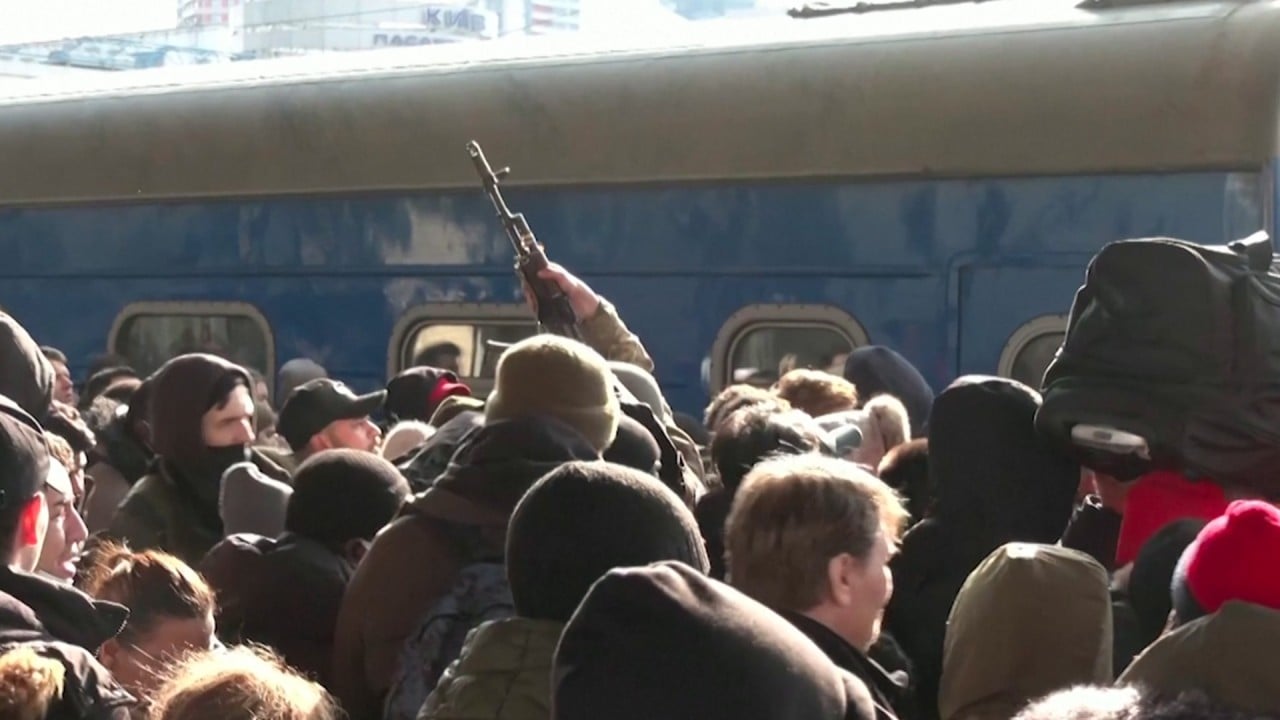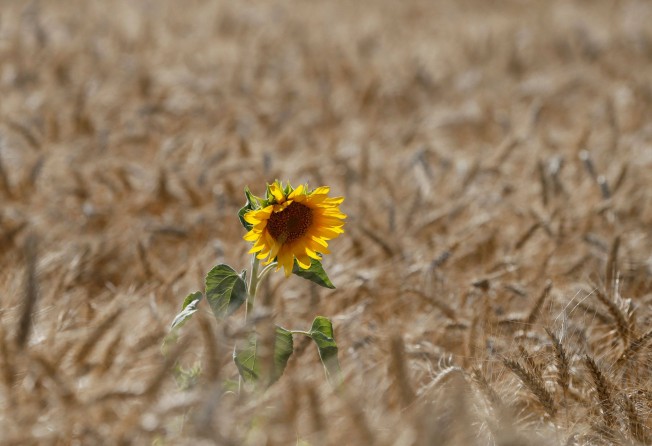
02:11
Ukraine conflict: Gunshots fired to disperse huge crowds at Kyiv train station

While bombs are falling across a bleak, wintry Ukraine, with Russian troops converging on Kyiv and forcing a land bridge between Crimea and the Russian-controlled eastern regions, it is right and proper that we are focusing on the human tragedy as it unfolds.
But the chance recollection of a brilliant Chatham House paper four years ago has got my head spinning in a different direction: the threat to global food security.
Most of us – even those able to stick a pin in Ukraine on a world map – may not realise that this former Soviet state has over the past two decades become a breadbasket to the world. Together with Russia, it is the source of 29 per cent of the world’s wheat exports. They also account for 19 per cent of exported maize and 80 per cent of sunflower oil.
In the 2017 Chatham House report “Chokepoints and Vulnerabilities in Global Food Trade”, the research team identified 14 critical “choke points” worldwide that could threaten global food chains – “critical junctures on transport routes through which exceptional volumes of trade pass”. Presciently, the report noted that choke points are “systematically overlooked in assessments of strategic food security”.
Some of these junctures, like the Strait of Malacca, the Suez Canal and the Panama Canal are maritime. Others are inland, like the Mississippi basin. Others are coastal – like Brazil’s southern food trade ports or the US’ Gulf coast ports.
But the most chokepoints converge around the Black Sea: the creaking Black Sea inland rail network; the Black Sea ports like Odessa, Berdansk and Sevastopol (which is now in Russian-controlled Crimea, and was closed to international shipping in 2014); and the Turkish Straits that allow passage out of the Black Sea and into the Mediterranean.
The Chatham House team identified the Black Sea region as the most volatile of choke points worldwide, citing factors such as “ongoing” conflict in Crimea and the fact that governments in both Ukraine and Russia “have proved willing to impose … export restrictions”. The Russian invasion of Ukraine clearly takes the risk to a whole new level.
With about a third of the world’s wheat exports coming through the Black Sea, a large number of economies, particularly in North Africa and the Middle East – the most food import-dependent region in the world – face supply risks that could in just a few months reach crisis level.
Commentators have been quick to recall that grain shortages – local or imported – were among the causes of the Arab spring uprisings, and the Syrian civil war.
As the Chatham House team reported, a billion people rely on imports to meet their food needs, and disruption to food trade chokepoints could cause food supply problems worldwide. They warned four years ago that “food trade choke points will pose a material and growing risk to systemic stability and to human security, chiefly in the world’s most food-insecure and politically volatile regions”.
Al Jazeera reported recently that Egypt bought 70 per cent of its wheat from Russia and Ukraine, and Turkey 74 per cent. Other major wheat importers like Indonesia and the Philippines face supply uncertainties. So too could China, which depends on Ukraine for about a third of its corn imports – mainly to feed its huge pig farming industry. It will be fascinating to discover in coming months whether China can use the recently built Belt and Road infrastructure across Central Asia to circumvent its reliance on the Black Sea ports.
Food prices worldwide have already surged over the past two years because of pandemic dislocation, and the upheaval to grain supplies from the Black Sea might only aggravate problems. The Food and Agriculture Organisation’s Food Price Index is at its highest point in 48 years, and up 25 per cent since 2014.
The FAO Cereals Price Index has jumped to its highest level since 2012, while the Vegetable Oil Price Index is at a historic high – up 65.8 per cent compared with the end of 2020.
Whether food prices spiral further – adding grievously to current worries about global inflation – will depend on how long conflict continues on the ground in Ukraine. Crops cannot be harvested if tanks are still roaring around, and Ukraine’s next grain harvest is in June. If war is still raging by then, the Chatham House team’s worst fears about dislocation of global food supplies may materialise. The already fragile hopes of economic recovery in the wake of the Covid-19 pandemic will evaporate.
While the threat to global food security is the highest priority, dislocation in Ukraine exposes other potentially serious vulnerabilities. The region is not only an important source of fertilisers, but of other obscure yet critical industrial inputs. Neon gas, for example, is essential for etching circuit designs on microchips, while Ukraine-based Ferrexpo is the world’s third largest exporter of high grade iron ore pellets. The company’s shares fell by over 40 per cent last Thursday.
Mondelez, which makes Cadbury chocolate and Oreos, has suspended operations in two Ukrainian factories and Carlesberg has shut down three breweries. Cargill, the huge US agricultural group, faces uncertainty over its majority-owned grain terminal near Odessa, after already having abandoned its sunflower-crushing plant in Donetsk after Russian patriots took control of the region in 2014.
As Ukrainians fight for their homes and their lives, the emerging threat to global food supplies will doubtless be the last thing on their minds. That does not mean the threat will go away, or become any less serious. We are living in a dangerously vulnerable world.
David Dodwell researches and writes about global, regional and Hong Kong challenges from a Hong Kong point of view